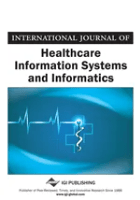
International Journal of Healthcare Information Systems and Informatics
Scope & Guideline
Shaping the evolution of healthcare through data and technology.
Introduction
Aims and Scopes
- Healthcare Informatics:
The journal emphasizes the application of information technology in healthcare settings, exploring how data management, electronic health records, and health information systems can improve patient care and operational efficiency. - Artificial Intelligence and Machine Learning:
A significant focus on the use of AI and machine learning techniques in diagnosing diseases, predicting patient outcomes, and optimizing healthcare processes reflects the journal's commitment to leveraging technology for better healthcare delivery. - Telemedicine and Remote Healthcare:
The journal addresses the growing importance of telemedicine, highlighting research on virtual health environments, remote patient monitoring, and the impact of technology on patient access to healthcare services. - Patient-Centered Care and Engagement:
Research in this journal often explores factors influencing patient engagement and satisfaction, aiming to understand how technology can enhance the patient experience and improve health outcomes. - Public Health and Epidemiology:
The journal includes studies on public health issues, including the impact of technology on disease prevention, health promotion, and the management of public health crises like pandemics.
Trending and Emerging
- COVID-19 Impact and Response Technologies:
Research addressing COVID-19, including the effectiveness of contact tracing apps and telehealth adoption, has surged, highlighting the critical role of technology in managing public health crises. - Big Data and Predictive Analytics in Healthcare:
There is a growing trend towards utilizing big data analytics and predictive modeling to enhance patient classification, disease prediction, and management strategies, demonstrating the journal's alignment with cutting-edge research. - Smart Healthcare Solutions and IoT Applications:
The emergence of smart healthcare systems, particularly those integrating IoT technologies for monitoring and patient care, indicates a significant trend towards innovative and connected health solutions. - Elderly Care Innovations:
With an aging population, there is an increasing focus on technologies aimed at improving elderly care, such as intelligent nursing systems and behavior recognition technologies, reflecting societal needs and technological advancements. - Interdisciplinary Approaches to Healthcare Challenges:
The journal is seeing more interdisciplinary research that combines healthcare with fields such as data science, engineering, and social sciences, indicating a holistic approach to solving complex healthcare issues.
Declining or Waning
- Traditional Health Information Systems:
Research focusing on traditional health information systems without the integration of advanced technologies such as AI or IoT has decreased, reflecting a shift towards more innovative approaches in healthcare informatics. - General Health Administration Studies:
There is a noticeable decline in studies that solely focus on health administration practices without the incorporation of technology-driven solutions, suggesting a move towards more technologically integrated research. - Basic Statistical Analysis in Healthcare:
Papers relying solely on basic statistical analyses without advanced computational methods or data science applications are becoming less frequent, indicating a trend towards more sophisticated analytical approaches.
Similar Journals
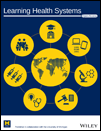
Learning Health Systems
Empowering healthcare with cutting-edge knowledge.Learning Health Systems is a premier open access journal published by WILEY that has been at the forefront of innovation in the fields of Health Informatics, Health Information Management, and Public Health since its inception in 2016. With a dedicated focus on the intersection of clinical practice and health technology, this journal is pivotal for researchers, professionals, and students seeking to advance the knowledge base in these critical areas. The journal enjoys a robust reputation, boasting a Q1 ranking in multiple categories as of 2023, and ranking within the top percentiles in both Medicine and Health Professions across various metrics. Designed to foster collaboration and dissemination of cutting-edge research, Learning Health Systems is committed to bridging gaps between data science and practical health applications while providing an accessible platform for transformative ideas. It invites contributions that challenge existing paradigms and promote innovative solutions that enhance healthcare delivery and patient outcomes.

TECHNOLOGY AND HEALTH CARE
Transforming Healthcare with Cutting-Edge SolutionsTECHNOLOGY AND HEALTH CARE, published by IOS PRESS, stands as a prominent interdisciplinary journal dedicated to the integration of technology within the healthcare sector. With an ISSN of 0928-7329 and an E-ISSN of 1878-7401, this journal has been a vital resource since its inception in 1993, providing insights and advancements in various categories including bioengineering, biomedical engineering, health informatics, and more. Though it currently holds a Q4 classification in several fields and Q3 in others, it actively contributes to the dialogue surrounding innovative methodologies and practices that enhance healthcare delivery. Researchers, professionals, and students will find the journal invaluable for its diverse range of studies that explore the convergence of technology and health. Its commitment to fostering impactful research continues to reinforce its relevance in the evolving landscape of healthcare technology.

Health Information Science and Systems
Transforming data into actionable health insights.Health Information Science and Systems, published by Springer, stands as a pivotal academic journal advancing the field of health informatics and information science. With its ISSN 2047-2501 and E-ISSN 2047-2501, this open-access journal aims to disseminate cutting-edge research and innovations that bridge the gap between healthcare and information technology. Since its inception in 2013, it has committed to enhancing understanding of health information systems, electronic health records, and data management strategies, impacting both clinical practice and healthcare policy. Researchers, professionals, and students engaged in health informatics will find indispensable insights and studies that pave the way toward improving health outcomes and system efficiencies. The journal provides a global platform for the dissemination of critical analyses and empirical studies up to the year 2024, making it an essential resource for those seeking to stay at the forefront of this rapidly evolving domain.
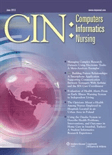
CIN-COMPUTERS INFORMATICS NURSING
Advancing Nursing Through Innovative InformaticsCIN-COMPUTERS INFORMATICS NURSING is a distinguished journal that publishes cutting-edge research at the intersection of nursing and information technology. Published by Lippincott Williams & Wilkins, the journal has been a pivotal platform since 2002, catering to the needs of health informatics professionals and nursing researchers. With an impressive impact factor and ranked within Q2 in Nursing (miscellaneous) and other relevant categories, it serves as a key resource for advancing knowledge and best practices in the field. The journal's inclusion in important databases ensures broad visibility and access to the latest findings that influence healthcare delivery. CIN-COMPUTERS INFORMATICS NURSING welcomes a diverse range of articles, including empirical studies, reviews, and innovative methodology approaches, making it an invaluable asset for clinicians, educators, and scholars dedicated to enhancing nursing informatics and improving patient outcomes.
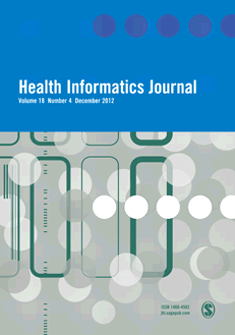
Health Informatics Journal
Advancing healthcare through innovative informatics.Health Informatics Journal, published by SAGE Publications Inc., serves as a premier platform for research and discussion in the dynamic field of health informatics since its inception in 1995. With an impressive Q2 ranking in the Health Informatics category and a notable 77th percentile ranking in the Scopus database, this journal provides an essential resource for academics and professionals alike. The journal's transition to Open Access since 2020 has further broadened its reach, ensuring that innovative research is accessible to a global audience. Covering a wide range of topics within health informatics, the journal aims to foster high-quality scholarly communication and facilitate the dissemination of cutting-edge insights that can help advance health care delivery and patient outcomes. With an ongoing commitment to excellence, the Health Informatics Journal is dedicated to enhancing the intersection of technology and healthcare through rigorous research and collaborative exploration.
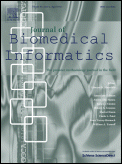
JOURNAL OF BIOMEDICAL INFORMATICS
Advancing healthcare through innovative informatics.JOURNAL OF BIOMEDICAL INFORMATICS, published by Academic Press Inc. Elsevier Science, is a premier peer-reviewed journal dedicated to the integration of computer science and health informatics to advance the field of biomedical engineering and healthcare. With its ISSN 1532-0464 and E-ISSN 1532-0480, this influential journal has established itself with an impressive impact factor, reflecting its high-quality research contributions. Recognized within the top quartile (Q1) of both Computer Science Applications and Health Informatics for 2023, the journal ranks #135 out of 817 in Computer Science Applications and #25 out of 138 in Health Informatics according to Scopus metrics. Offering open access options, it fosters extensive dissemination and accessibility of groundbreaking research findings to the scientific community. As a scholarly platform from 2001 to 2024, it is engineered to cater to the educational needs of researchers, professionals, and students, promoting innovative studies that bridge the gap between technology and healthcare.

Health Care Management Science
Innovating strategies for optimal health care delivery.Health Care Management Science, published by Springer, is a leading journal dedicated to advancing the fields of health care management and medical administration. With an impressive impact factor reflecting its strong academic influence and a Q1 quartile ranking in both Health Professions and Medicine categories, it stands out as a valuable resource for researchers, professionals, and students interested in optimizing health care systems. The journal, with its ISSN 1386-9620 and E-ISSN 1572-9389, features a variety of original research articles, case studies, and theoretical insights aimed at addressing contemporary challenges in health care. Spanning from 1998 to 2024, it continues to play a pivotal role in disseminating knowledge and best practices that enhance health care delivery and management strategies. Although it does not currently offer open access, its rigorous peer-review process ensures the publication of high-quality content that contributes significantly to the academic community and beyond.

Healthcare Technology Letters
Bridging the gap between technology and health outcomes.Healthcare Technology Letters is a leading open-access journal published by WILEY that has been at the forefront of disseminating cutting-edge research in the field of health informatics and health information management since its inception in 2014. With an E-ISSN of 2053-3713, this esteemed journal is recognized for its commitment to advancing knowledge and practice in healthcare technology, making it a vital resource for researchers, professionals, and students alike. The journal's scope encompasses a wide range of topics, including digital health solutions, data management, and innovative technologies that enhance patient care. It holds a respectable position in the academic community, featuring a Q3 ranking in both health informatics and health information management as of 2023, and consistently contributing to high-impact research evidenced by its Scopus rankings. By providing open access to its content since 2017, Healthcare Technology Letters ensures that valuable insights and breakthroughs can reach a broader audience, furthering the impact of its published work on the global health landscape.

International Journal of E-Health and Medical Communications
Elevating health management through digital advancements.Welcome to the International Journal of E-Health and Medical Communications, a pivotal publication designed to bridge the gap between health informatics and computer science applications. Published by IGI Global, this journal serves as a platform for innovative research and insights into e-health technologies, health communication strategies, and the evolving role of digital tools in enhancing healthcare delivery and management. With an ISSN of 1947-315X and E-ISSN 1947-3168, it caters to an audience keen on advancing the intersection of technology and health, as evidenced by its respectable standings in Scopus rankings—positioned in the 64th percentile in Health Informatics and 63rd in Computer Science Applications. Over its publication history from 2010 to 2024, the journal has consistently contributed to significant discussions and advancements within these fields, highlighted by its Q3 quartile ranking in 2023. Join a community of researchers, professionals, and students dedicated to the ongoing exploration of e-health, as we collectively navigate the complex landscape of healthcare innovation.
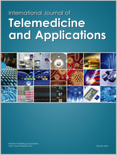
International Journal of Telemedicine and Applications
Bridging gaps in healthcare with state-of-the-art research.International Journal of Telemedicine and Applications is a premier open-access journal published by HINDAWI LTD, focused on the rapidly evolving field of telemedicine and health informatics. With an ISSN of 1687-6415 and E-ISSN of 1687-6423, this journal has been a key resource for researchers, healthcare professionals, and students since its inception in 2007. Based in Egypt, the journal has established a global presence, reflected in its diverse range of articles that cover topics from computer networks to health information management. Its impact is underscored by its impressive rankings in Scopus, including notable positions such as 34th in Health Informatics and 15th in Health Information Management. The journal is classified in Q2 quartiles for four influential categories, showcasing its relevance and contribution to the field. With an ongoing publication timeline from 2008 to 2024, International Journal of Telemedicine and Applications is crucial for advancing knowledge and practice in telemedicine, offering researchers and practitioners the opportunity to explore innovative solutions in healthcare delivery.